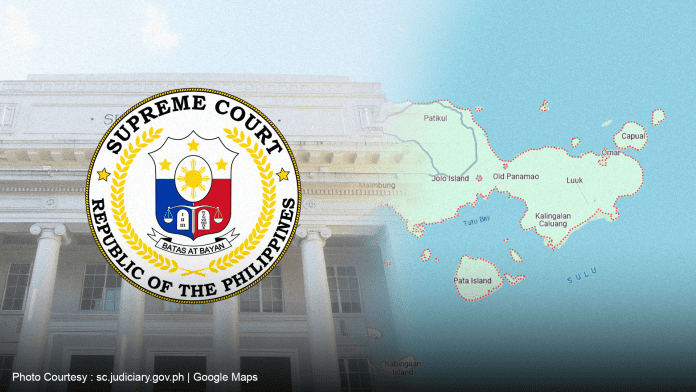MANILA – The Supreme Court (SC) on Monday upheld the validity of Republic Act No. 11054 or the Organic Law for the Bangsamoro Autonomous Region in Muslim Mindanao (BARMM), but declared Sulu not part of BARMM after the province rejected the law’s ratification.
In a unanimous decision, the Supreme Court granted the petition challenging Sulu’s inclusion in BARMM but denied challenges to other aspects of the Bangsamoro Organic Law, according to a news release.
“The decision is immediately executory,” the Court said.
The Court declared unconstitutional the interpretation of the provision in the law directing the provinces and cities of ARMM (Autonomous Region in Muslim Mindanao) to vote as one geographical unit as including provinces that did not vote to be included.
“This violates Article X, Section 18 of the Constitution, which states that only provinces, cities, and geographic areas voting favorably in the plebiscite shall be included in the autonomous region,” the Court explained.
“As Sulu rejected the Bangsamoro Organic Law in the plebiscite, it was wrong to include the province in BARMM,” the SC said.
The Bangsamoro Organic Law, enacted on July 27, 2018, provided for the establishment of BARMM as a political entity and its corresponding basic governmental structure.
The BARMM’s creation and determination of its territorial jurisdiction shall take effect upon the law’s ratification by majority of the votes cast in a plebiscite.
A plebiscite was conducted on Jan. 21, 2019, covering areas of then ARMM and Isabela City in Basilan and Cotabato City.
Another plebiscite was held on Feb. 6, 2019, in Lanao del Norte, municipalities in North Cotabato, and other areas that petitioned for voluntary inclusion.
The majority of the ARMM ratified the law, except for Sulu.
Despite this, Sulu was included in BARMM, prompting the province to file the present petition assailing the law.
Meanwhile, the SC ruled that the Bangsamoro Organic Law is constitutional because it does not make BARMM a separate state from the Philippines.
“The said law did not give it the power to enter into relations with other states, nor did it grant the BARMM its sovereignty,” it said.
“The BARMM’s autonomy is limited to its internal governance. The fact that it was granted greater autonomy than other territorial and political subdivisions does not imply separation from the national government.”
The Court also upheld the parliamentary form of the Bangsamoro government.
“An autonomous region is not prohibited from prescribing a form of government that differs from the national government so long as it upholds democratic principles,” it said.
“The Bangsamoro government is democratic, with the members of the Parliament elected by its people as representatives. In turn, the Bangsamoro Parliament elects a chief minister who shall exercise the executive powers of the Bangsamoro government.” (PNA)

